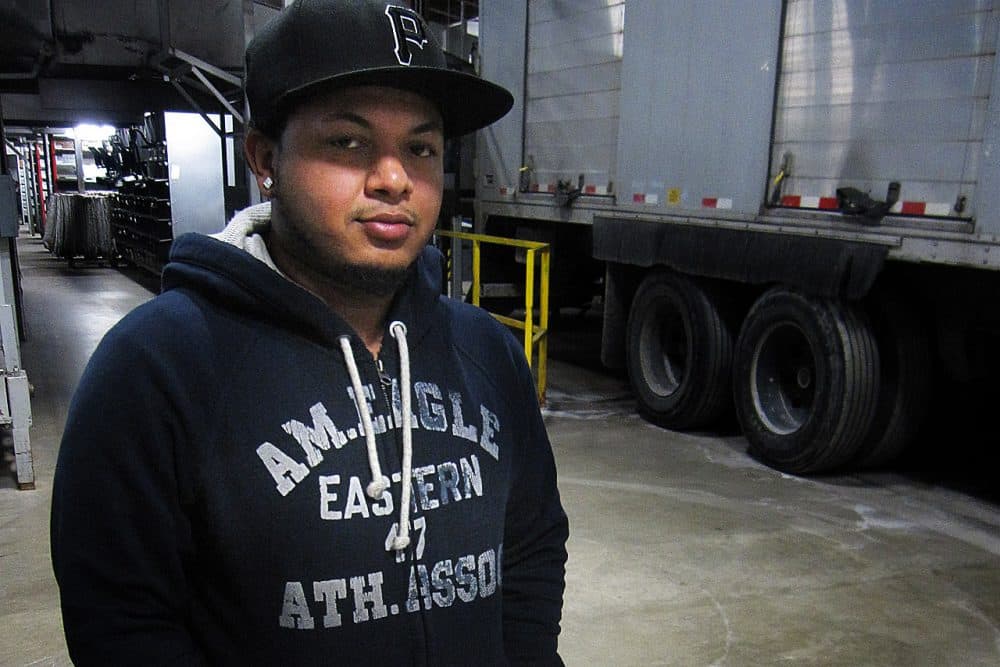Advertisement
Mass. High Court Weighs 'Correct' Legal Advice On Possible Deportations
Resume
About one out of every six immigrants deported from the New England region last year was living in the United States legally. They were permanent residents kicked out primarily because of criminal convictions.
Immigrants often say they don't understand the risks of pleading guilty, especially to nonviolent offenses. But soon they might have some clarity.
The Massachusetts Supreme Judicial Court (SJC) is considering a case that could shed some light on the specific language a lawyer must give a non-citizen client about immigration consequences. The implications could affect hundreds of immigrants in the state.
The DeJesus Case
Elan DeJesus moved from the Dominican Republic to Roslindale when he was 11. He's now 30 and has two kids who are U.S. citizens. He works at a UPS warehouse in South Boston.
In 2009, he was arrested and charged with trafficking cocaine.
DeJesus says his attorney told him he could avoid jail time if he pleaded guilty to a slightly lesser offense, possession with the intent to distribute.
"He told me that was the best for me," DeJesus said. "He never explained to me what's going to happen to me."
DeJesus claims he didn't understand the danger.
"They told me, like, maybe I can get deported," he said. "But they never said that was going to happen. They said maybe, you know. Maybe, maybe, like it can happen, but I don't know. That's not mean you gonna get deported, right? So, that's why I plead guilty."
In 2010, in a case called Padilla vs. Kentucky, the U.S. Supreme Court ruled that according to the Sixth Amendment, lawyers have a duty to give their non-citizen clients correct advice about immigration consequences. But what constitutes "correct"? The court didn't elaborate.
Phil Torrey, who lectures at Harvard Law School, says the DeJesus case could offer some guidance. Torrey, who focuses on the intersection of immigration and criminal law, has previously defended immigrant clients, but he doesn't have a stake in this case.
"I think the fact that the SJC has picked it up, and that the SJC wants to weigh on what type of advice is really required in these circumstances, that the decision could have very wide implications in Massachusetts," he said.
DeJesus did not face deportation right away. For a year and a half he was living a relatively normal life. He was on probation, but not in jail. Then, one day, he was arrested for driving with a suspended license.
He went to court and was told that U.S. Immigration and Customs Enforcement (ICE) had a deportation order for him.
DeJesus then withdrew his guilty plea, saying that if he had known pleading guilty would lead to his removal, he would have gone to trial instead. He claimed his attorney did not give him accurate advice. Judge Paul Healy, the judge in the Trial Court, agreed with him.
But the Suffolk County district attorney thought Healy was making a mistake and appealed. That's when the state's highest court intervened and grabbed the case.
Last month, during oral arguments, there was sparring about what precisely lawyers need to tell their clients. The issue in front of the SJC is whether DeJesus received correct legal advice.
DeJesus' attorney has testified that he told his client he was "facing deportation," and that he was "eligible" for deportation.
Analysts say the implications of the ruling could mean much more than one immigrant’s quest to stay in the U.S.
"That eligibility implies that there is a possibility, or a significant one, that they are not going to find you, that they are not going to deport you," said Eduardo Masferrer, DeJesus' new attorney who's representing him in this case.
"By pleading guilty to this matter, you will automatically be banished from the United States," Masferrer said. "Your removal is certain, maybe not today, maybe not tomorrow, but when immigration finds you and gets you, you're going to be deported from the United States, and you'll never be able to return."
State prosecutor Zachary Hillman disagrees.
"Deportation or removal is never a certainty," he said.
Hillman says the government can't, and doesn't, remove every immigrant who's technically subject to deportation.
"Telling a client that they will be deported is incorrect advice," he said. "And it's incorrect advice based on the very language of the deportation statute, which says that if convicted of one of these types of offenses, it makes the person deportable upon the order of the attorney general."
All this back-and-forth between lawyers arguing over words probably sounds baffling, and that's precisely the problem.
This is a nitty-gritty case. Almost everyone seems to interpret the same facts differently.
For Hillman, telling an immigrant that he's "eligible" for deportation is fair because it's accurate.
But Wendy Wayne doesn't think so.
Wayne heads the Immigration Impact Unit of the Massachusetts public defender’s office, which filed an amicus brief in the case. Wayne says for some crimes, like possession with the intent to distribute cocaine, there is very little gray area, and lawyers need to make that clear.
"Saying to someone 'You're eligible for deportation' is vague and misleading," she said.
Wayne says the advice should be tailored to the individual.
"So, in this case, for example," she said, "Mr. DeJesus should have been told that even though you have lived in the U.S. legally with a green card since you were 11 years old, and been lawfully employed for many years, and have no prior criminal record, because this is considered an aggravated felony, if you plead guilty, you're deportation is virtually certain."
For Torrey, the Harvard law lecturer, saying you're eligible for deportation isn't correct, and neither is saying you will be deported. Torrey says the SJC should offer a standard in its decision, not a formula.
"For the court to come out and say, 'You have to give this type of advice in this circumstance, this type of advice in this circumstance,' etcetera, I think that that would open up a Pandora’s box that would be really difficult to follow," he said, "but if the court comes out and says that an ordinary, fallible lawyer is required to meet a particular standard, and that standard involves analyzing the law, conveying the law to the client, and analyzing the client's facts, I think that's sufficient."
The Impact Of The Decision

Last year, ICE reported that 471 legal permanent residents from New England were deported, mainly because of criminal convictions, so analysts say the implications of the SJC ruling could mean much more than one immigrant's quest to stay in the U.S.
In September, Massachusetts became the first and only state to part ways with the U.S. Supreme Court and say that the Padilla case applied retroactively. That means non-citizen clients punished 10 or 15 years ago who can prove their lawyers gave them bad or no advice about immigration consequences have a right to appeal.
Torrey says Massachusetts is also the first state in the country to try to grapple with this lawyer's duty question in its highest court.
"You know, the commonwealth has been a leader in this sort of area," he said, "so it really has an opportunity, I think, to do something that is gonna affect legal advice in Massachusetts and beyond."
Torrey says other states are watching what's happening in Massachusetts, and so the SJC essentially has an opportunity to shape the conversation across the nation.
While lawyers and justices continue the legal debate, DeJesus remains in limbo. If the SJC rules in his favor, he'll still have to go to trial for the cocaine charge.
The Supreme Judicial Court is expected to make a decision in his case this spring.
